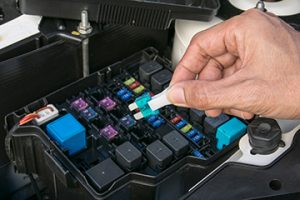Vehicle Fuses: What They Are and Why They Matter at Meineke in Shelbyville
When everything in your car—from the lights to the radio—works perfectly, your vehicle fuses are likely doing their job without you even noticing. Because these small yet powerful components protect your car’s electrical system, they help prevent costly damage and frustrating malfunctions. Whether you’re cruising through Shelbyville or heading out for a weekend drive, reliable fuses are essential to a smooth and safe ride.
At Meineke in Shelbyville, we understand that even a single blown fuse can shut down important vehicle functions. So, in this post, we’ll explain what vehicle fuses are, what they do, how they work, how to maintain them, and when to see a mechanic for help.
So, What Vehicle Fuses Are
To start, vehicle fuses are compact safety devices that protect specific electrical circuits in your car. Because your car depends on a wide range of electrical systems—like your lights, windows, fans, and sensors—each system is protected by a corresponding fuse. Although fuses may look simple, they serve a critical role in guarding against circuit overloads.
Since every vehicle has a fuse box or even multiple fuse panels, knowing where your fuses are located is important for proper maintenance.
So, What Vehicle Fuses Do
Essentially, vehicle fuses act as barriers that stop the flow of electricity when something goes wrong. For instance, if a component draws too much power due to a short circuit or malfunction, the fuse “blows” and shuts down that circuit immediately. As a result, it prevents further electrical damage or even the risk of fire.
Because the fuse sacrifices itself to save the rest of the system, it’s often the first sign of an underlying issue that needs attention.
So, How Vehicle Fuses Work
At their core, vehicle fuses are made of a thin metal strip designed to melt when electrical current exceeds safe levels. First, when electricity flows through the circuit normally, the fuse remains intact and lets power reach the component. Then, if the amperage rises beyond the fuse’s rating, the metal inside heats up and breaks the connection. Consequently, this action stops the electrical flow instantly.
Since each fuse is designed for a specific voltage and amperage, replacing it with the correct type is essential for safety.
So, How to Maintain Vehicle Fuses
Even though fuses are low-maintenance, they can still fail due to heat, age, or corrosion. So, here are a few practical ways to keep them in top shape:
-
Always schedule regular inspections at Meineke in Shelbyville to identify worn or vulnerable fuses
-
Because moisture can cause rust or shorts, keep your fuse boxes clean and dry
-
If you need to replace a fuse, thus always use the exact same rating listed in your owner’s manual
-
Since overloaded circuits often blow fuses, avoid installing aftermarket electronics without proper installation
-
To catch issues early, investigate any blown fuses right away instead of repeatedly replacing them
When to See a Mechanic at Meineke in Shelbyville
Although replacing a fuse is sometimes simple, repeated issues signal that something bigger may be wrong. So, be sure to schedule service at Meineke in Shelbyville if:
-
Suddenly, your power windows, door locks, or interior lights stop working
-
Repeatedly, the same fuse blows—even after replacement
-
Clearly, there are burning smells or melted plastic near your dashboard
-
Unexpectedly, your car’s systems begin acting erratically or flickering
-
If your fuse box looks corroded, then professional attention is necessary to prevent major electrical damage

So, Call Meineke in Shelbyville Today for Fuse Diagnostics and Electrical Repair
Because vehicle fuses protect your car’s most important electrical systems, ignoring them can lead to bigger problems. At Meineke in Shelbyville, our ASE-certified technicians can test, replace, and diagnose fuse issues quickly—saving you time, stress, and money. Whether it’s a simple fuse swap or an advanced wiring repair, we’re here to help.
So, call Meineke today and keep your car’s electrical system safe—because big problems often start with small warning signs.
If the Meineke in Shelbyville is not a convenient auto repair center for you, Meineke also has 15 car repair centers is Kentucky:
Meineke Car Care – Dixie Hwy
5326 Dixie Highway
Louisville, KY 40216
Call (844) 311-4548
Meineke Car Care – Preston Hwy
7103 Preston Highway
Louisville, KY 40219
Call (844) 605-8457
Meineke Car Care – Bardstown Rd
4170 Bardstown Road
Louisville, KY 40218
Call (844) 321-3541
Meineke Car Care – East Broadway
701 East Broadway
Louisville, KY 40202
Call (855) 973-7820
Meineke Car Care – Outer Loop
6420 Outer Loop
Louisville, KY 40228
Call (844) 417-2336
Meineke Car Care – Shelbyville Rd
11514 Shelbyville Road
Louisville, KY 40243
Call (844) 352-0216
Meineke Car Care – Dupont Rd
1019 Dupont Road
Louisville, KY 40207
Call (502) 791-9526
Meineke Car Care – Plantside Drive
10723 Plantside Drive
Louisville, KY 40299
Call (502) 536-9765
Meineke Car Care – South Dixie Blvd
2197 South Dixie Blvd
Radcliff, KY 40160
Call (866) 548-1474
Meineke Car Care – Shelbyville Rd
3949 Shelbyville Rd
St Matthews, KY 40207
Call (888) 633-4889
Meineke Car Care – North Dixie Hwy
1400 North Dixie Hwy
Elizabethtown, KY 42701
Call (877) 439-7844
Meineke Car Care – Midland Trail
2000 Midland Trail
Shelbyville, KY 40065
Call (844) 681-4659
Meineke Car Care – West Hwy 146
3717 KY-146
Buckner, KY 40010
Call (844) 353-6212
Meineke Car Care – Peachtree Rd
100 Peachtree Road
Nicholasville, KY 40356
Call (859) 687-8290
Meineke Car Care – Arrowhead Ct
101 Arrowhead Court
Frankfort, KY 40601
Call (833) 723-5010
Meineke Car Care – Fort Campbell Blvd
2516 Fort Campbell Blvd
Hopkinsville, KY 42240
(270) 838 2296
